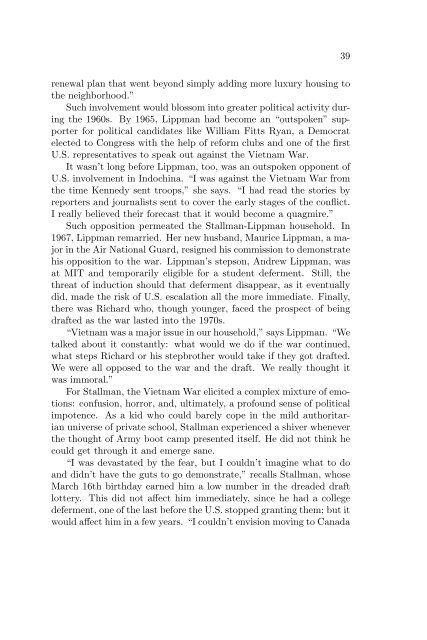You also want an ePaper? Increase the reach of your titles
YUMPU automatically turns print PDFs into web optimized ePapers that Google loves.
enewal plan that went beyond simply adding more luxury housing to<br />
the neighborhood.”<br />
Such involvement would blossom into greater political activity during<br />
the 1960s. By 1965, Lippman had become an “outspoken” supporter<br />
for political candidates like William Fitts Ryan, a Democrat<br />
elected to Congress with the help of reform clubs and one of the first<br />
U.S. representatives to speak out against the Vietnam War.<br />
It wasn’t long before Lippman, too, was an outspoken opponent of<br />
U.S. involvement in Indochina. “I was against the Vietnam War from<br />
the time Kennedy sent troops,” she says. “I had read the stories by<br />
reporters and journalists sent to cover the early stages of the conflict.<br />
I really believed their forecast that it would become a quagmire.”<br />
Such opposition permeated the Stallman-Lippman household. In<br />
1967, Lippman remarried. Her new husband, Maurice Lippman, a major<br />
in the Air National Guard, resigned his commission to demonstrate<br />
his opposition to the war. Lippman’s stepson, Andrew Lippman, was<br />
at MIT and temporarily eligible for a student deferment. Still, the<br />
threat of induction should that deferment disappear, as it eventually<br />
did, made the risk of U.S. escalation all the more immediate. Finally,<br />
there was Richard who, though younger, faced the prospect of being<br />
drafted as the war lasted into the 1970s.<br />
“Vietnam was a major issue in our household,” says Lippman. “We<br />
talked about it constantly: what would we do if the war continued,<br />
what steps Richard or his stepbrother would take if they got drafted.<br />
We were all opposed to the war and the draft. We really thought it<br />
was immoral.”<br />
For Stallman, the Vietnam War elicited a complex mixture of emotions:<br />
confusion, horror, and, ultimately, a profound sense of political<br />
impotence. As a kid who could barely cope in the mild authoritarian<br />
universe of private school, Stallman experienced a shiver whenever<br />
the thought of Army boot camp presented itself. He did not think he<br />
could get through it and emerge sane.<br />
“I was devastated by the fear, but I couldn’t imagine what to do<br />
and didn’t have the guts to go demonstrate,” recalls Stallman, whose<br />
March 16th birthday earned him a low number in the dreaded draft<br />
lottery. This did not affect him immediately, since he had a college<br />
deferment, one of the last before the U.S. stopped granting them; but it<br />
would affect him in a few years. “I couldn’t envision moving to Canada<br />
39


